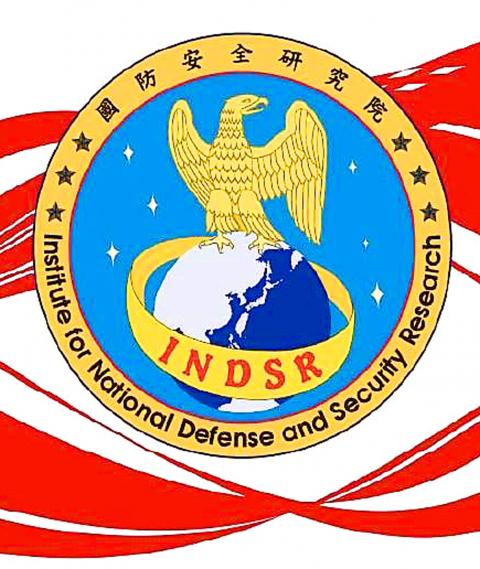China has expanded its propaganda efforts to the cyberspace with the aim of influencing young Taiwanese via emergent media, the Institute of National Defense and Security Research said.
Beijing is using ground and Web-based propaganda to influence Taiwanese, the Ministry of National Defense-affiliated think tank said in the latest issue of its journal, the National Defense and Security Weekly.
Ground-based propaganda refers to China’s efforts to spread its influence at grassroots level by targeting Taiwan’s borough wardens and temples, while Web-based propaganda focuses on infiltrating emergent media, buying Facebook groups and recruiting Internet celebrities, the institute said.

Photo: Tu Chu-min, Taipei Times
For example, a local online job bank in April hired a self-professed “supporter of peaceful unification” to run its political party fan page, showing that China is pushing its agenda strategically and systematically, it said.
Beijing’s so-called 31 measures aimed at attracting Taiwanese businesses and professionals have failed to gain traction, but China is moving beyond them to develop a “united front” in Taiwan by utilizing information technologies that cater to a younger audience, it added.
The China Taiwan Network page under China’s Taiwan Affairs Office Web site has links to a “youth commune” and articles promoting the measures, the journal said, adding that China-based online video streaming service iQiyi (愛奇藝) has partnered with the office.
Beijing’s increased use of emergent media is also evident in the videos on platforms that feature Taiwanese businesspeople and young people espousing pro-China views, it said.
The institute said it believes China uses metadata, artificial intelligence and other technologies to analyze what content young Taiwanese consume and exploit the information to cultivate sympathy for Beijing, it said.
China’s short-term strategy is to mount an interference campaign targeting next year’s presidential election, while its long-term aim is to divide Taiwanese society to facilitate its ultimate goal of annexation, the institute said, citing a National Security Bureau report issued in May.
China is certain to improve the technical sophistication and professionalism of its measures, which would lead to real-time reactions to ongoing events, the institute said.

EUROPEAN TARGETS: The planned Munich center would support TSMC’s European customers to design high-performance, energy-efficient chips, an executive said Taiwan Semiconductor Manufacturing Co (TSMC, 台積電), the world’s largest contract chipmaker, yesterday said that it plans to launch a new research-and-development (R&D) center in Munich, Germany, next quarter to assist customers with chip design. TSMC Europe president Paul de Bot made the announcement during a technology symposium in Amsterdam on Tuesday, the chipmaker said. The new Munich center would be the firm’s first chip designing center in Europe, it said. The chipmaker has set up a major R&D center at its base of operations in Hsinchu and plans to create a new one in the US to provide services for major US customers,

The Ministry of Transportation and Communications yesterday said that it would redesign the written portion of the driver’s license exam to make it more rigorous. “We hope that the exam can assess drivers’ understanding of traffic rules, particularly those who take the driver’s license test for the first time. In the past, drivers only needed to cram a book of test questions to pass the written exam,” Minister of Transportation and Communications Chen Shih-kai (陳世凱) told a news conference at the Taoyuan Motor Vehicle Office. “In the future, they would not be able to pass the test unless they study traffic regulations

‘A SURVIVAL QUESTION’: US officials have been urging the opposition KMT and TPP not to block defense spending, especially the special defense budget, an official said The US plans to ramp up weapons sales to Taiwan to a level exceeding US President Donald Trump’s first term as part of an effort to deter China as it intensifies military pressure on the nation, two US officials said on condition of anonymity. If US arms sales do accelerate, it could ease worries about the extent of Trump’s commitment to Taiwan. It would also add new friction to the tense US-China relationship. The officials said they expect US approvals for weapons sales to Taiwan over the next four years to surpass those in Trump’s first term, with one of them saying

‘COMING MENACINGLY’: The CDC advised wearing a mask when visiting hospitals or long-term care centers, on public transportation and in crowded indoor venues Hospital visits for COVID-19 last week increased by 113 percent to 41,402, the Centers for Disease Control (CDC) said yesterday, as it encouraged people to wear a mask in three public settings to prevent infection. CDC Epidemic Intelligence Center Deputy Director Lee Chia-lin (李佳琳) said weekly hospital visits for COVID-19 have been increasing for seven consecutive weeks, and 102 severe COVID-19 cases and 19 deaths were confirmed last week, both the highest weekly numbers this year. CDC physician Lee Tsung-han (李宗翰) said the youngest person hospitalized due to the disease this year was reported last week, a one-month-old baby, who does not